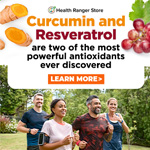
Scientists find lack of vitamin K could cause age-related diseases
Sunday, October 18, 2009 by: S. L. Baker, features writer
Tags: vitamin K, health news, Natural News
- Warp Speed 2.0: Trump Administration ACCELERATES Gates-funded, self-amplifying bird flu vaccines
- DMSO and Natural Dyes: A suppressed cancer treatment resurfaces in independent research
- Chemical cocktails in processed foods linked to diabetes, validating natural health warnings
- Transhuman vectors of disease: Young adults continue to produce spike proteins ONE YEAR after receiving COVID vaccine
- Study finds bananas more effective than salt reduction for lowering blood pressure
- 8 U.S. states may EXPAND vaccine exemptions in 2025, and parents have many reasons to STOP THE SHOTS
- Prominent doctors call for new holistic therapies to address CANCER SPIKE: Tree barks provide anti-cancer treatment options
- Fermented foods like sauerkraut may outshine modern medicine in gut health, research finds
- STAGING BEFORE RELEASE: WHO Runs 2-Day Pandemic Simulation 'Exercise Polaris'
- Ancient mummies rewrite human history with “ghost” lineage discovery
- Aerosolized bioweapons? Strange “diploid biomasses” falling out of the sky in Florida captured under the microscope
- Surge in KIDNEY FAILURES linked to common medications
- Millions of gun owners could be challenged in court and lose their firearms if DOJ doesn’t step in to stop crazy ATF rule
- Mike Adams releases country western hit single: Goin’ Back in Time is Comin’ Home
- Analysis: The coming economic collapse, a mass uprising and Trump's three secret weapons to halt the growing revolt
- Widespread social and economic unrest: Steve Quayle issues urgent financial warning of imminent asset collapse in new interview with Mike Adams
- Israeli lobbyists boast of controlling US national security policy in leaked AIPAC audio
- Fauci is back in the limelight, and he’s busy promoting a future COVID or FLU pandemic
- Israeli lobbyists boast of controlling US national security policy in leaked AIPAC audio
- Aerosolized bioweapons? Strange “diploid biomasses” falling out of the sky in Florida captured under the microscope
- Analysis: The coming economic collapse, a mass uprising and Trump's three secret weapons to halt the growing revolt
- Fauci is back in the limelight, and he’s busy promoting a future COVID or FLU pandemic
- Widespread social and economic unrest: Steve Quayle issues urgent financial warning of imminent asset collapse in new interview with Mike Adams
- Kiss Your Genetic Privacy Good-Bye! 23andMe Gets Green Light to Sell Your Intimate Genetic Details to Anyone They Want
- Mike Adams releases country western hit single: Goin’ Back in Time is Comin’ Home
- U.S. lawmakers investigate Meta over alleged China collaboration
- Tulsi Gabbard leads charge against the Biden regime’s global censorship of the 'Disinformation Dozen'
- Pfizer's RSV vaccine linked to preterm births as drug giant CONCEALED RISKS from pregnant women in unethical clinical trials
- Dane Wigington exposes climate engineering as ‘All-Out Weather and Biological Warfare’
- Shedding light on the dark side of MMR vaccines: How vaccinated individuals SPREAD MEASLES & put the vulnerable at risk
- TAKE IT DOWN Act advances in Congress amid free speech concerns
- CLOT SHOT PLANDEMIC UNFOLDING: Fibrous, rubbery clots caused by covid injections have prion-like seeding activity
- Chemtrails unveiled: How the CIA and Big Business are manipulating the weather for profit
- Curcumin’s ancient healing power supercharges muscle recovery, and its effects are compounded with anti-inflammatory foods and supplements
- Criminal referral requests filed against Fauci and top COVID officials in seven states
- Defunding DEADLY mRNA jabs: Government funding for mRNA technology being scrutinized and sidelined until proven "safe and effective" for real
- Newly released JFK files reveal Pentagon's role in creating Lyme disease and covid in the same lab
- Analysis: The coming economic collapse, a mass uprising and Trump's three secret weapons to halt the growing revolt
- Mike Adams releases country western hit single: Goin’ Back in Time is Comin’ Home
- Aerosolized bioweapons? Strange “diploid biomasses” falling out of the sky in Florida captured under the microscope
- Kiss Your Genetic Privacy Good-Bye! 23andMe Gets Green Light to Sell Your Intimate Genetic Details to Anyone They Want
- European Court of Justice: Healthcare professionals who promoted or administered COVID-19 vaccines are CRIMINALLY LIABLE for any harm caused
- Federal employees whine over DOGE's new directive requiring them to do a 5-point summary of weekly accomplishments
- Widespread social and economic unrest: Steve Quayle issues urgent financial warning of imminent asset collapse in new interview with Mike Adams
- U.S. approves new Russian ambassador as diplomatic thaw continues
- Government waste exposed: Hegseth supports Musk’s demand for accountability from federal workers
- Now you can HEAR chemistry: Health Ranger translates molecules into music in stunning video demonstration that will blow your mind (and your ears)
- Fauci is back in the limelight, and he’s busy promoting a future COVID or FLU pandemic
- CLOT SHOT PLANDEMIC UNFOLDING: Fibrous, rubbery clots caused by covid injections have prion-like seeding activity
- I Want My Bailout Money – new song released by Mike Adams
- I Want My Bailout Money – new song and music video released by Mike Adams
- Tulsi Gabbard leads charge against the Biden regime’s global censorship of the 'Disinformation Dozen'
- Trump administration poised to overhaul crypto regulations with new SEC leadership
- The Health Ranger releases “Vaccine Zombie” song and music video, using AI-animated zombies for the music video
- Red Cross issues warning to stop blood plasma donations from vaccinated people
- Scientists confirm: GENIUS brain function can be spontaneously unleashed in humans without any apparent cause
- EPA advisor admits the agency is funneling billions to climate groups ahead of Trump’s return to White House
- HYSSOP: What research reveals about the health benefits of this ancient holy herb
- Two containers with completed ballots fall out of truck in Florida
- Newly released JFK files reveal Pentagon's role in creating Lyme disease and covid in the same lab
- Global leaders unite to clamp down on “misinformation” with UN-backed Cascais Declaration
- Mike Adams releases country western hit single: Goin’ Back in Time is Comin’ Home
- BREAKING: 2025 NDAA authorizes mandatory military draft of WOMEN across America… as Pentagon pursues global NUCLEAR war with both Russia and China at the same time
- Michael Yon warns of a ZIONIST TAKEOVER in Trump’s second administration
- The Health Ranger releases “Vaccine Zombie” song and music video, using AI-animated zombies for the music video
- Ozempic and Wegovy weight loss drugs are injectable LIZARD VENOM PEPTIDES that may unleash a devastating wave of organ failure… side effects align with symptoms of SNAKE BITES
- BOMBSHELL: DNA testing kits are a SCAM to develop ethnic-specific bioweapons
- Israeli soldiers accused of even more torture and abuse in the West Bank
- I Want My Bailout Money – new song released by Mike Adams
- These 13 countries just signed an agreement to engineer a global FAMINE by destroying food supply
- NASA admits that climate change occurs because of changes in Earth’s solar orbit, and NOT because of SUVs and fossil fuels
- RFK Jr. clears key hurdle: Sen. Susan Collins backs controversial HHS nominee, signaling a new era for health policy
The study, conducted by Children's Hospital Oakland Research Institute scientists Joyce McCann, PhD, and Senior Scientist, Bruce Ames, PhD, involved reviewing data from hundreds of published articles dating back to the 1970's. Dr. Ames has been on the trail of how vitamins and other micronutrients positively affect health for years. In fact, back in 2006 he proposed his "triage" theory which states diseases associated with aging like cancer, heart disease and dementia -- as well as the rate of the aging process itself -- may be unintended consequences of mechanisms developed during evolution in order to protect humans when there were shortages of vitamin and mineral rich foods.
The new analysis, slated for publication in the October 2009 issue of the American Journal of Clinical Nutrition, strongly supports this theory and could have huge implications for preventive medicine because Dr. Ames believes even modest vitamin and mineral deficiencies, which are common, could result in age-related illnesses. His theory calls for a new scientifically based and consistent strategy for establishing what vitamin and mineral intakes are truly optimal and for looking for early biomarkers of chronic disease.
"Encouraging support for the triage theory from our vitamin K analysis suggests that experts aiming to set micronutrient intake recommendations for optimal function and scientists seeking mechanistic triggers leading to diseases of aging may find it productive to focus on micronutrient-dependent functions that have escaped evolutionary protection from deficiency," Dr. McCann said in a statement to the media.
Dr. Ames and Dr. McCann have announced plans to conduct a series of scientific literature-based reviews to test the basic ideas behind the triage theory. Their goal is to document how micronutrients may help halt disease. In a press release, a reviewer of the current vitamin K analysis stated it "...provides a unique perspective of consequences of vitamin K insufficiency and may serve as an important future reference, as new vitamin K dependent proteins are identified and new (non-clotting) functions of vitamin K are elucidated. More broadly, an assessment of micronutrient sufficiency from the perspective of triage theory may provide a valuable point of view, as current recommendations for nutrient intakes are reconsidered."
Interesting facts about vitamin K
Vitamin K is a fat-soluble vitamin derived from the German word "koagulation", which refers to the fact the vitamin is essential for blood clot coagulation. However, while about half of the 16 known proteins that depend on vitamin K are necessary for blood coagulation, other vitamin K-dependent proteins are involved in a variety of different functions involving the skeletal, arterial, and immune systems.As NaturalNews has previously reported, scientists have found that adequate vitamin K levels appear to play an important role in keeping inflammation in the body in check (https://www.naturalnews.com/023503_vitamin_K_...) and research is mounting that it can help prevent a loss of bone mass leading to osteoporosis, too (https://www.naturalnews.com/025231_vitamin_K_...).
In addition to food sources, vitamin K is made in the body by bacteria that line healthy gastrointestinal tracts. But people living in both the United States and the United Kingdom have been found to have far less than currently recommended intakes of the vitamin K. Moreover, those recommendations are only based on the amount of the vitamin mecessary for adequate blood coagulation, not for optimal health. The new analysis by Dr. McCann and Dr. Ames supports what many nutrition experts have claimed for years: higher intakes of vitamin K are needed for health than are currently recommended by mainstream medicine.
For more information:
http://www.childrenshospitaloakland.org/abou...
https://www.naturalnews.com/vitamin_K.html
http://lpi.oregonstate.edu/infocenter/vitami...
http://www.nlm.nih.gov/medlineplus/ency/arti...
Vitamin K at FETCH.news
Get independent news alerts on natural cures, food lab tests, cannabis medicine, science, robotics, drones, privacy and more.
Take Action: Support Natural News by linking to this article from your website
Permalink to this article:
Embed article link: (copy HTML code below):
Reprinting this article:
Non-commercial use OK, cite NaturalNews.com with clickable link.
Follow Natural News on Facebook, Twitter, Google Plus, and Pinterest
Science News & Studies
Medicine News and Information
Food News & Studies
Health News & Studies
Herbs News & Information
Pollution News & Studies
Cancer News & Studies
Climate News & Studies
Survival News & Information
Gear News & Information
News covering technology, stocks, hackers, and more



"Big Tech and mainstream media are constantly trying to silence the independent voices that dare to bring you the truth about toxic food ingredients, dangerous medications and the failed, fraudulent science of the profit-driven medical establishment.
Email is one of the best ways to make sure you stay informed, without the censorship of the tech giants (Google, Apple, Facebook, Twitter, YouTube, etc.). Stay informed and you'll even likely learn information that may help save your own life."
–The Health Ranger, Mike Adams













































